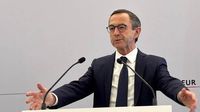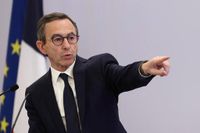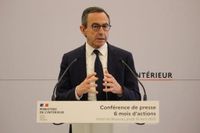Bruno Retailleau, the Minister of the Interior, is making waves as he sets his sights on the presidency of Les Républicains, leveraging his recent six-month assessment to showcase his achievements in immigration and public safety. On April 10, 2025, Retailleau held a press conference to underscore his actions since taking office, emphasizing the urgency of his role during a time of crises.
Retailleau, who is vying for the leadership of Les Républicains in May, aims to use this position as a stepping stone towards a presidential candidacy in 2027. He has been vocal about his work, particularly in immigration, knowing full well that this issue is a focal point for many voters. "Six months of action," he declared, presenting a litany of statistics to demonstrate his effectiveness.
During his address, Retailleau highlighted a remarkable 9% increase in forced removals from France, alongside the dismantling of 269 immigration networks in 2024. He noted that while there have been successes, such as the vote on the anti-drug trafficking bill currently under consideration, there is still much work to be done. "The consumer is not a victim," he stated, underscoring his commitment to tackling drug-related issues.
In the realm of public safety, Retailleau reported a 202% increase in cocaine seizures during the first two months of 2025 compared to the same period in 2024, totaling 10,375 kg. He also mentioned that the number of fixed fines imposed on drug users rose by 4% from October 2024 to February 2025, with an average of 530 fines issued daily. These figures are meant to illustrate his administration's tough stance on crime.
However, not all statistics were as promising. While there was a decrease in physical violence on public transport by 4% and a 17% drop in violent robberies without weapons, Retailleau's report did not shy away from acknowledging that sexual violence had increased by 7% and burglaries by 1% in 2024. This mixed bag of results has led to questions about the effectiveness of his policies and his ability to restore order.
Retailleau has faced criticism from various quarters, notably from his political rival Laurent Wauquiez, who has labeled him as a "minister of words" rather than action. In response, Retailleau asserted that meaningful legislative changes take time, especially in a National Assembly where his party does not hold a majority. He emphasized, "It is not in a few months that we can create legislation to protect the French. The battle to restore order will take time and requires ruptures." This acknowledgment of the challenges ahead reflects a pragmatic approach to governance.
As he navigates these political waters, Retailleau is also attempting to manage relations with Algeria, particularly in light of the recent arrest of writer Boualem Sansal. He has called for a renewal of cooperation on migration, insisting that Algeria must accept its nationals who are in an irregular situation in France. "The judge of peace will be the results," he remarked, highlighting the importance of tangible outcomes in his dealings with the Algerian government.
Moreover, Retailleau's ministry has introduced measures to tighten the conditions for naturalization, including raising the required level of French language proficiency for residency permits starting January 1, 2026. He insists that the right to reside in France is a privilege that comes with responsibilities, stating, "The right to stay is a favor granted to a foreigner on French soil. Therefore, we must impose conditions." This stance has stirred debate among his political peers, with Wauquiez proposing even more stringent measures.
As the clock ticks down to the party elections in May, Retailleau is keenly aware of the political implications of his actions. He aims to position himself as a strong leader capable of handling the country's pressing issues while also appealing to the base of Les Républicains. His rhetoric of urgency and endurance reflects a desire to resonate with voters who feel the weight of crime and immigration on their daily lives.
In his assessment, Retailleau has framed his time at Beauvau as a promise for the future, asserting that if given the reins of power, he could achieve even more. "If we had the reins tomorrow, we could do so much more," he expressed with a sense of hopefulness. This forward-looking perspective is crucial as he seeks to galvanize support ahead of the upcoming elections.
Despite the challenges he faces, including the potential for political backlash if results do not materialize, Retailleau remains optimistic. "Time is my ally," he stated, though he also acknowledged that each passing day in office carries its own political cost. The balance he must strike between delivering results and maintaining political favor is delicate.
Ultimately, Bruno Retailleau's six-month review serves as both a reflection of his current achievements and a blueprint for his future ambitions. As he continues to navigate the complexities of his role, the eyes of the French public remain fixed on his next moves. Will he be able to deliver on his promises and solidify his position as a leader within Les Républicains and beyond? Only time will tell.









